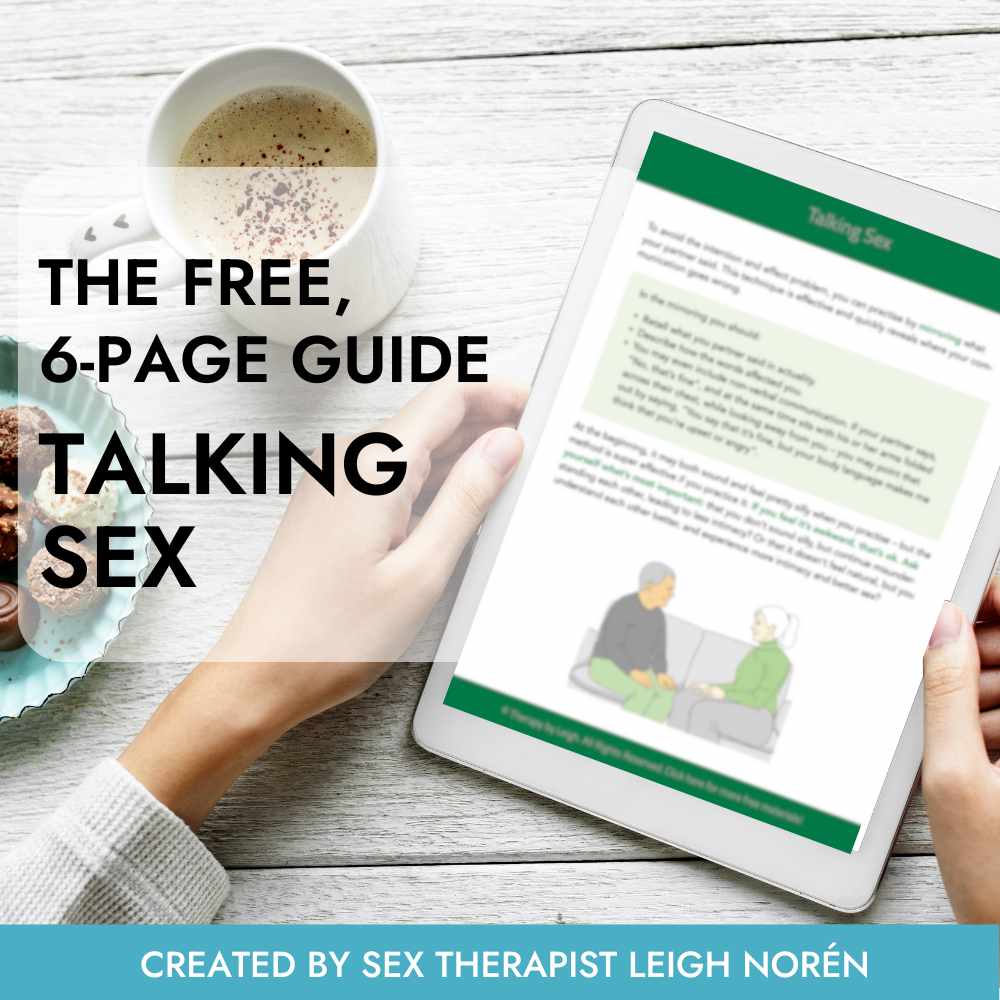How To Talk About Sex When You’re Struggling With Mismatched Libidos
First published 7th January, 2020. Updated 28th April, 2025.
6 min read
Having mismatched libidos is something many couples experience. But despite it being common — talking about it can feel like navigating an absolute minefield.
In this article
When you and your partner aren’t aligned in your sex drives, finding effective ways to communicate about sex can preserve emotional and sexual intimacy — and boost overall relationship satisfaction.
Because when one partner wants to have sex and the other doesn’t, it’s easy to fall into the blame game.
Maybe you react in anger, questioning why they always or never want sex.
Or you start worrying that their lower sexual desire means they’re falling out of love with you.
Feeling rejected or confused by your libido mismatch is only natural.
Whether you’re the low or high desire partner — everything you feel is valid. But sharing it all without a filter will likely only deepen the divide. That chasm that’s already been created by your different sexual needs.
For instance, if you’re wondering why sex feels like nothing, pointing fingers won’t lead to more pleasure in the bedroom. Even if it temporarily alleviates some of that worry and frustration you may be feeling.
Unfiltered communication can trigger defensiveness. And once defensiveness enters the mix, understanding tends to exit the room.
And this defensiveness is why mismatched sex drives often spiral into arguments, resentment, and emotional distance — creating a wall between you.
The more pressure, anger, or disappointment you express, the more your partner may retreat — physically and emotionally.
So if you’re hoping for your partner to want sex more, or for you to feel less pressure when it comes to sex — think about how to talk about mismatched libidos together. Because your communication style can directly affect your and your partner’s libido and shape the sexual and emotional intimacy you share.
How to Sit With Tough Feelings Without Exploding
When that familiar frustration bubbles up, pause. Let yourself feel the feelings — without immediately acting on them right away.
Ask yourself: “Will saying this now help?” And consider both the immediate impact and the long-term effects of what you want to say. This usually puts our frustration in perspective and helps us communicate more effectively.
When emotions are high, there are ways to express needs that protect your partner’s feelings while still helping you get across what they need to know. Start with the strategies below.
Four Ways to Talk When You Have a Libido Mismatch
Communicating about a sex drive mismatch can feel awkward and tricky. You’re afraid if you bring it up it will result in another round of arguments, and you also have no idea how to do it without hurting their feelings.
By following these four steps below — timing, intention, clarity, and perspective — you will help keep your conversation open and productive. These strategies are important for learning to communicate effectively, especially when facing the challenge of a desire discrepancy.
1. Choose Your Moment Wisely
Let’s be honest, there’s no perfect moment to bring up your mismatched libidos in your relationship, but there are definitely better ones.
Try to avoid the topic mid-argument. Even if it can be tempting to bring it up when feelings are already running high, like after rejection or immediately after sex that hasn’t gone as you’d hoped — it can lead to more harm than good.
While it may feel more natural to bring up the conversation right there are then as sex is “on the mind”, it usually feels more like critique than curiosity. Like you’re evaluating your partner’s performance as opposed to trying to understand and solve the issue together.
Instead, wait until you’re both calm again. When you’ve had time to work through your emotions and you don’t feel frustrated or sad. That’s when true understanding is more likely to happen.
Then, when the time feels right, say something like:
“There’s something I’d like to talk about that’s important to me. Can we chat?”
Have you grabbed your free resource yet?

My free resource, Talking Sex, helps you and your partner reduce conflict and misunderstandings about sex.
Download the guide, and you also get instant access to my deeply appreciated weekly newsletter. You can unsubscribe at any time.
2. Work out What Your Ideal Sex Life Would Look Like
Before you start talking, make sure you have an idea in your mind of what you ideally would like sex to look like in your relationship.
- Would you like more frequent sex—weekly, monthly?
- Are you craving more non-sexual intimacy, like cuddling or kissing?
- Would more appreciation and emotional closeness help you feel more connected?
For some, sexual desire can increase when we feel loved up and validated by our partner.
Seeking validation through sex is also common. But if your sexual relationship is strained (or non-existent), try letting daily closeness feed your need for connection, first.
When there’s a mismatched libido in marriage or a partnership, emotional reconnection is often one of the first steps to rebuilding a satisfying sex life.
However, if you already feel like your emotional connection is strong, and it’s like you’re stuck in the roommate phase of marriage — you might need something else to begin with.
3. Plan What You Want to Say
When communicating about a libido mismatch — clarity matters. You want to think about what you want to say and what your partner needs to know. What are you truly feeling? What do you need your partner to understand about the situation?
For instance, maybe you’re feeling one of the following:
“Sometimes I’m afraid you’ll leave because we’re not having frequent enough sex.”
Or
“I want to find a way to work on our mismatched libidos together.”
Or
“It’s been a while since we were intimate now, and I feel sad about it because it makes me feel like we’re no longer close.”
Or
“I’d love to talk about how we can create more physical intimacy that feels good for us both, even if it doesn’t lead to having more sex right now”.
Saying something like the statements above shows how the situation is affecting you, without placing blame. It also opens up the conversation for you to work together.
Because the truth is — mismatched libidos is never about one person being “right” and the other person being “wrong”. It’s about trying to find a way to bridge the gap.
And this can only be done together.
4. Focus on “I” Statements, Not “You” Statements
During conversations about sex — it’s often tempting to say what your partner is doing wrong. After all, when we’re experiencing problems, it’s easy to focus on what the other person is getting wrong.
But doing this often shuts the conversation down and creates a wall between you. Instead, try reframing what you say from “you” to “I” to encourage openness.
For instance:
Instead of:
“You never want to have sex anymore.”
Say:
“I miss being close to you sexually. Can we talk about it?”
Instead of:
“You just want sex all the time!”
Try:
“Sometimes I think I feel a little pressured to have sex. Can we work out how to avoid this together? Because I want it to feel light and easy, like it used to.”
Talking About Sexual Desire Discrepancy Doesn’t Have to End In a Fight
Most of us were never taught how to deal with mismatched libidos. It’s not as if the subject was covered at school! But the way we talk about it often has a direct impact on the trajectory of our sex life. This is why learning to talk about it gently and openly can change everything.
Whether you’re in a new relationship or dealing with mismatched sex drives in marriage; understanding, empathy, and practical tools can lead to more desire, more connection, and less frustration.
Yes, it might feel vulnerable. And scary. And incredibly awkward. But if you think about it, that’s a small discomfort when the potential reward is a more satisfying sexual and emotional bond.
If you’re ready to tackle your mismatched libidos and create more desire and closeness with your partner, my online program Re:Desire could be the next step for you.
Designed using sexological science and therapeutic frameworks, it draws from my years of hands-on experience as a sex therapist and coach.
Re:Desire is a comprehensive solution that helps you reignite sexual intimacy and emotional connection—without pressure or stress.
*First shared on *www.sexologkliniken.com

Zero sex drive?
You’re not alone! Download the 10-page Desire Test to find out why your desire for sex is gone (and what to do about it).
Questions based on a variety of factors proven to negatively affect desire
Find out which factors are responsible for your low or non-existent sex drive
Get instant access to expert advice, delivered directly to your inbox when you download The Desire Test. Unsubscribe anytime.
WANT TO KNOW MORE ABOUT THE DESIRE TEST?
With 9 years of experience as a sex therapist and coach - Leigh helps her clients create stress-free, shame-free, pressure-free sex lives, through her unique combination of sexological science, & psychotherapeutic & coaching tools.
OTHER POSTS YOU MIGHT ENJOY
Copyright © 2019-2026 Leigh Norén. All Rights Reserved. | Website by Pinegate Road
Cookie policy | Terms & Conditions | Privacy Policy


